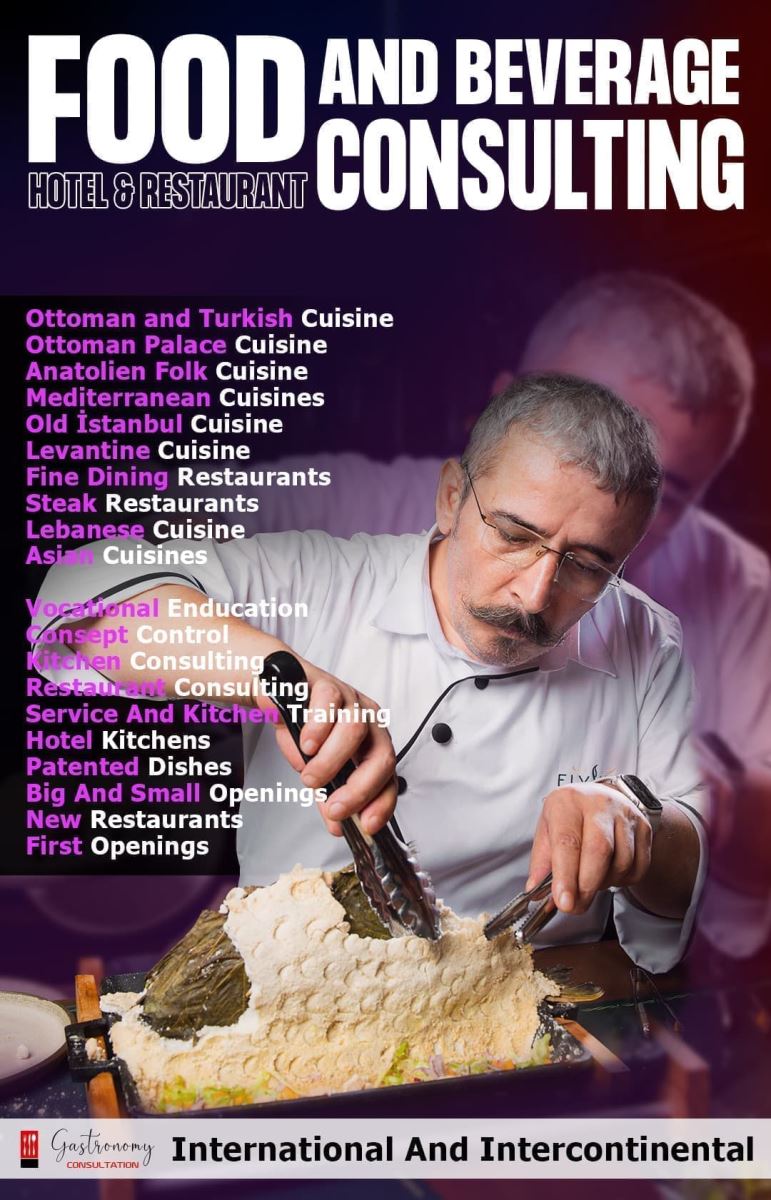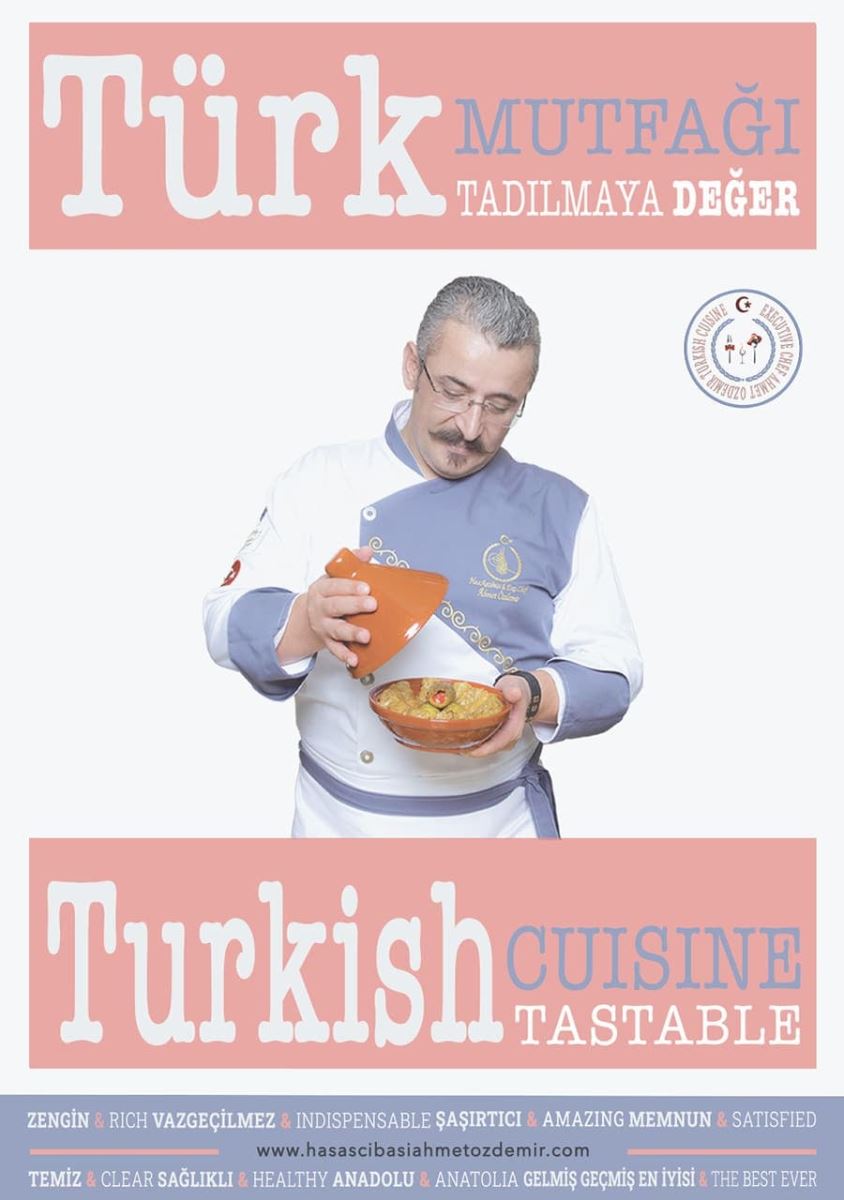What is Turkish Cuisine? Why is Turkish Cuisine Rich? What are the Characteristics of Turkish Cuisine? What is the History of Turkish Cuisine, One of the Most Rooted Cuisines in the World? What are the Most Used Products in Turkish Culinary Culture? What are the Most Known Local Cuisines in Turkish Cuisine?
 What is Turkish Cuisine?
What is Turkish Cuisine?
Coord. Chef Ahmet ÖZDEMİR
What is Turkish Cuisine? Why is Turkish Cuisine Rich? What are the Characteristics of Turkish Cuisine? What is the History of Turkish Cuisine, One of the Most Rooted Cuisines in the World? What are the Most Used Products in Turkish Culinary Culture? What are the Most Known Local Cuisines in Turkish Cuisine?
Turkish cuisine is a rich and diverse culinary tradition that has evolved over many centuries. Influenced by a multitude of cultures—including Central Asian, Middle Eastern, Mediterranean, and Balkan cuisines—Turkish food offers a wide array of flavors and dishes, from meat-based kebabs to vegetable stews and from syrupy desserts to a rich variety of breads.
"Turkish cuisine", which is also the center of the world's flavors arising from the convergence of Silk Road products in the center of Istanbul, reached its true richness during the Ottoman Empire.
Several factors contribute to the richness of Turkish cuisine:
Geographical Diversity:
Turkey's diverse geography includes coasts, mountains, and fertile plains, offering a wide array of ingredients.
Historical Influences:
Turkey has been a crossroads of civilizations. From Byzantine to Ottoman influences, (
Ottoman Kitchen History) various empires have left their mark on its cuisine.
Cultural Exchange:
The
Ottoman Empire was a melting pot of cultures, and this had a profound effect on its culinary traditions, incorporating flavors from the Balkans, the Middle East, and Central Asia.
Seasonal Ingredients:
The use of fresh, seasonal produce is a defining characteristic of Turkish food.
Artisanal Techniques:
Traditional methods of food preservation, like pickling and fermentation, as well as techniques like slow-cooking stews or grilling, add to the complexity of flavors.
Characteristics of Turkish Cuisine
Meze:
A variety of appetizers served before the main course.
Grilled Meats:
Kebabs are a staple, with many regional variations.
Vegetable Dishes:
Often served in olive oil, sometimes as cold dishes.
Breads and Pastries:
From "simit" to "pide," bread is essential.
Dairy:
Yogurt, cheeses, and dairy-based sauces like "cacık" are common.
Desserts:
Rich, often syrupy sweets like "baklava" and "lokma."
Spices and Herbs:
Cumin, sumac, mint, and parsley are frequently used.
Beverages:
Tea ("çay") and coffee ("Türk kahvesi") are essential,
Ottoman Serbets, as is the anise-flavored spirit "raki."
 History of Turkish Cuisine
History of Turkish Cuisine
The
Turkish Cuisine History has a long, complex history that dates back to the nomadic Turkic peoples in Central Asia. It underwent significant transformations with the migration to Anatolia, interactions with the Byzantine Empire, and the subsequent formation and expansion of the Ottoman Empire. Dishes we consider "Turkish" today are often a result of centuries of culinary evolution influenced by cultural exchange with Arabic, Persian, Italian, French, and Balkan cuisines, among others.
Meats:
Lamb, beef, and chicken are commonly used.
Vegetables:
Eggplant, bell peppers, cucumbers, and tomatoes are staples.
Legumes:
Lentils, chickpeas, and white beans are widely used.
Grains:
Rice and bulgur feature in many dishes.
Nuts and Seeds:
Pine nuts, pistachios, and sesame seeds are common.
Dairy:
Yogurt, feta, and other cheeses are essential.
Fruits:
Citrus, pomegranates, and grapes are popular.
Spices and Herbs:
Garlic, onions, cumin, sumac, and mint.
Most Known Local Cuisines in Turkish Cuisine
Aegean Cuisine:
Features olive oil-based vegetable dishes and seafood.
More meat-centric, with influences from Central Asia.
Southeastern Cuisine:
Known for its spicy dishes and kebabs.
Black Sea Cuisine:
Features fish and corn-based dishes like "mıhlama."
 Turkish cuisine enjoys international fame for several reasons:
Turkish cuisine enjoys international fame for several reasons:
Diversity of Flavors:
One of the standout features of Turkish cuisine is its vast range of flavors, which can be both complex and comforting. It offers something for everyone, from spicy meat dishes to rich, sweet desserts.
Historical Significance:
Turkish cuisine has a long history dating back to the Ottoman Empire and beyond, influenced by various cultures such as Central Asian, Middle Eastern, Mediterranean, and even Balkan cuisines. This rich history piques global interest.
The diversity of cooking methods—from grilling and roasting to fermenting and preserving—adds a unique aspect that sets it apart from other cuisines.
Global Turkish Population:
The global diaspora of Turkish people has helped spread the cuisine around the world. Turkish restaurants and food trucks can be found in many international cities, offering authentic dishes that garner a following among locals.
Applicability and Adaptability:
Turkish food can be made to suit a wide variety of dietary preferences and restrictions. Whether you are vegetarian, vegan, or gluten-free, you can usually find something delicious to eat.
Beverages:
Turkish tea and coffee have a cult following around the world. The unique preparation methods and cultural significance of these beverages add to the allure of Turkish cuisine.
Sweet Treats:
Desserts like baklava, Turkish delight, and künefe are not only delicious but also unique in their preparation, making them internationally popular.
Cultural Exchange:
Turkey’s geographic location as a bridge between Europe and Asia has made it a melting pot of cultures, which is reflected in its cuisine. This gives it a universal appeal, with elements that are familiar to various different cultures.
Media and Tourism:
The global interest in Turkish dramas, music, and culture has also influenced the popularity of its cuisine. Tourists often return home with fond memories of the food, creating more demand for Turkish culinary offerings.
Affordability:
Many Turkish dishes use simple, affordable ingredients to create flavorsome results, making it popular among people of all backgrounds.

Hospitality:
The Turkish emphasis on hospitality and sharing meals enhances the dining experience, whether in a home or restaurant, and leaves a lasting impression on international visitors.
High-Quality Ingredients:
The use of fresh, quality ingredients like seasonal vegetables, locally sourced meats, and aromatic spices make Turkish dishes stand out for their flavor and nutritional value.
Each of these factors contributes to Turkish cuisine's global appeal and the growing interest in its rich and varied culinary landscape.
Each region contributes its own techniques, flavors, and specialty dishes to the rich tapestry that is Turkish cuisine. Levantine cuisine, which was formed within the Ottoman cuisine during the Ottoman period, emerged as a cuisine containing the flavors of the Ottoman palace cuisine and old Istanbul cuisine.
Levantine cuisine, which is especially preferred by the distinguished rich people of Istanbul, is a fusion cuisine born from the accumulation of flavors of different cultures.
Coord. Chef Ahmet ÖZDEMİR
International And Intercontinental
Restaurant Consultant and Kitchen Consultant